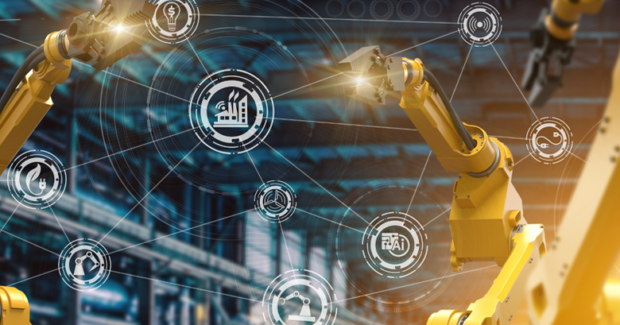How Will AI Impact the Manufacturing Workforce?
At the “Manufacturing in 2030 Project: Let’s Talk about AI” event, the takeaways included the opportunity to reimagine jobs to add value that AI will help to illuminate.
Posted: January 25, 2023
AI is changing the way manufacturers do business—from the production line to the back office and across the supply chain. At the Manufacturing Leadership Council’s Manufacturing in 2030 Project: Let’s Talk about AI event last month in Nashville, Tennessee, panelists discussed how those sweeping changes would alter, and enhance, the manufacturing workforce.
A collaboration between the MLC (the NAM’s digital transformation arm) and the MI (the NAM’s 501(c)3 workforce development and education partner), the event provided key insights for manufacturers into how technology and workforce trends interact with each other. Here are a few key takeaways.
Net positive: “The history of technology adoption is about improving the job quality of individuals on the shop floor. AI helps them to do the job better, provide them with better tools, gives them greater authority and ultimately increases the value-add of their jobs. All of that is a net positive for those individuals,” said MI Vice President of Workforce Solutions Gardner Carrick.
- By leveraging data and enabling greater efficiency, AI will improve communication, increase collaboration across disciplines and stimulate innovation, according to the panel.
- In addition, “AI can even inform the workforce’s creativity by working with it to design a new product or system,” said Jacey Heuer, lead, data science and advanced analytics, Pella Corporation.
Skills needed: While you might expect that implementing AI requires workers skilled in programming, data science and machine learning, manufacturers will also need to expand their bench of critical thinkers and problem-solvers. The panelists had a few tips to help companies along.
- Invest in upskilling programs to make the AI integration process at your company smoother and develop the talent you already have.
- Update job descriptions to reflect the skill sets the company will need in the next five to seven years.
- Consider recruiting for and teaching adaptive skills—skills that enable individuals to adapt easily to changing demands and environments—which can increase the flexibility of your workforce.
- Build partnerships with local schools, community colleges and technical and vocational schools to develop talent pipelines that will meet your needs.
The human-AI collaboration: While AI will take over monotonous, repetitive tasks, the panelists predicted that the industry will continue to center around human labor.
- “You can teach AI to do X. You can teach AI to do Y. [However,] combining the two may be really difficult for AI, while a human can do it better. You’re going to continue to see humans in roles that center on making decisions and telling stories,” said Asi Klein, managing director, industrial products and organization transformation, Deloitte Consulting.
- Meanwhile, AI adoption will likely lead to an increase in available jobs, as more skilled workers will be needed to guide and inform these new processes.
The last word: “Over the last 12 years, we’ve seen a lot of technology adoption, but we have not seen a lot of job loss. In fact, we’ve seen job gains,” said Carrick. “There is a lot of opportunity to reimagine jobs to add value that AI will help to illuminate.”
www.manufacturingleadershipcouncil.com
Subscribe to learn the latest in manufacturing.















